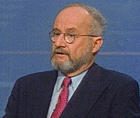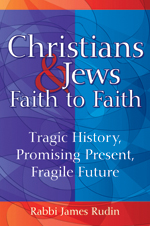Rabbi James Rudin. Christians & Jews – Faith to Faith: Tragic History, Promising Present, Fragile Future. Jewish Lights Publishing: 2011. ISBN: 9781580234320.
Rabbi James Rudin is widely recognized as an international leader in interreligious relations. He has been affiliated with the American Jewish Committee (AJC) since 1968 in a variety of roles including National Interreligious Affairs Director. Since retiring from that position in 2000, he has served as Senior Interreligious Affairs Director. Rudin has received numerous awards for his work including the Person of Reconciliation Award from the Polish Council of Christians and Jews in Warsaw; the Joseph Award from the Villa Nazareth, a Pontifical Institution; and an Interfaith Medallion from the International Council of Christians and Jews. He writes a weekly commentary for the Religion News Service and has published articles in sources including The New York Times, The Los Angeles Times, Newsday, Reform Judaism, Commonweal, The Journal of Ecumenical Studies, The Christian Century, and Christianity Today. He is the author of numerous books including Christians & Jews – Faith to Faith: Tragic History, Promising Present, Fragile Future (2011), The Baptizing of America: The Religious Right’s Plans for the Rest of Us (2006), and Israel for Christians: Understanding Modern Israel (1983). Among the list of books he has co-authored or co-edited are A Time to Speak: The Evangelical-Jewish Encounter (1987) and Twenty Years of Jewish-Catholic Relations (1986).
Christians & Jews – Faith to Faith tells the story of Christian and Jewish interreligious relations over the last two millennia. Rather than lamenting the “tragic history” or glamorizing the “promising present” or fearing the “fragile future,” Rudin seeks to educate his readers through an engaging and historically accurate account of interreligious relations. The author’s four decades experience as both scholar and practitioner in the field, enable him to craft the material in such a way that the newcomer and the long time advocate alike can glean considerable wisdom for the task of interreligious interaction. While focusing on these two faiths (Judaism and Christianity), he recognizes that historically two partner dialogue has expanded to include the three Abrahamic faiths (Judaism, Christianity, and Islam) in recent years.
The book is well suited for both individual and group study. A discussion guide provides the framework for an exercise in interreligious dialogue that a reader could arrange between her or his congregation and a nearby synagogue.
While those readers who feel they already have a firm grasp on the historical data or those who tend to avoid reading historical materials may be tempted to skip ahead to the latter chapters in which Rudin offers suggestions for the future, I would advise they not do so. It is only with an enriched understanding of the past and present that these future possibilities can begin to take form and through the efforts of many become reality.
So What?
Rudin writes to encourage action. In his final chapter, he includes his “Ten Commandments for Successful Jewish-Christian Dialogue:”
- Be there
- Don’t try to defend the indefensible regarding your own faith
- Listen
- Focus
- Avoid simply preaching Bible texts, history or law (include the experiential/autobiographical)
- The person with the most words usually loses
- Know your audience
- Journalists may sometimes be inadequately informed, but they are usually interested in religious matters
- Seek areas of solidarity and mutual respect
- Don’t try to change people’s minds; concentrate on enlightenment, explanation, and clarifications (pp.225-7)
If you have been a Christians your entire life, what have you done to learn more about Judaism? Do you tend to paint that faith with a broad brush and offer generalizations that if offered by someone of another faith about Christianity would leave you feeling quite uncomfortable and your faith mischaracterized?
In recent years, what has your faith community done to engage in interreligious partnerships, service projects, worship, and/or dialogue? If these efforts have been limited or do not yet exist, how can you act as a catalyst to birth them or increase their scope?

